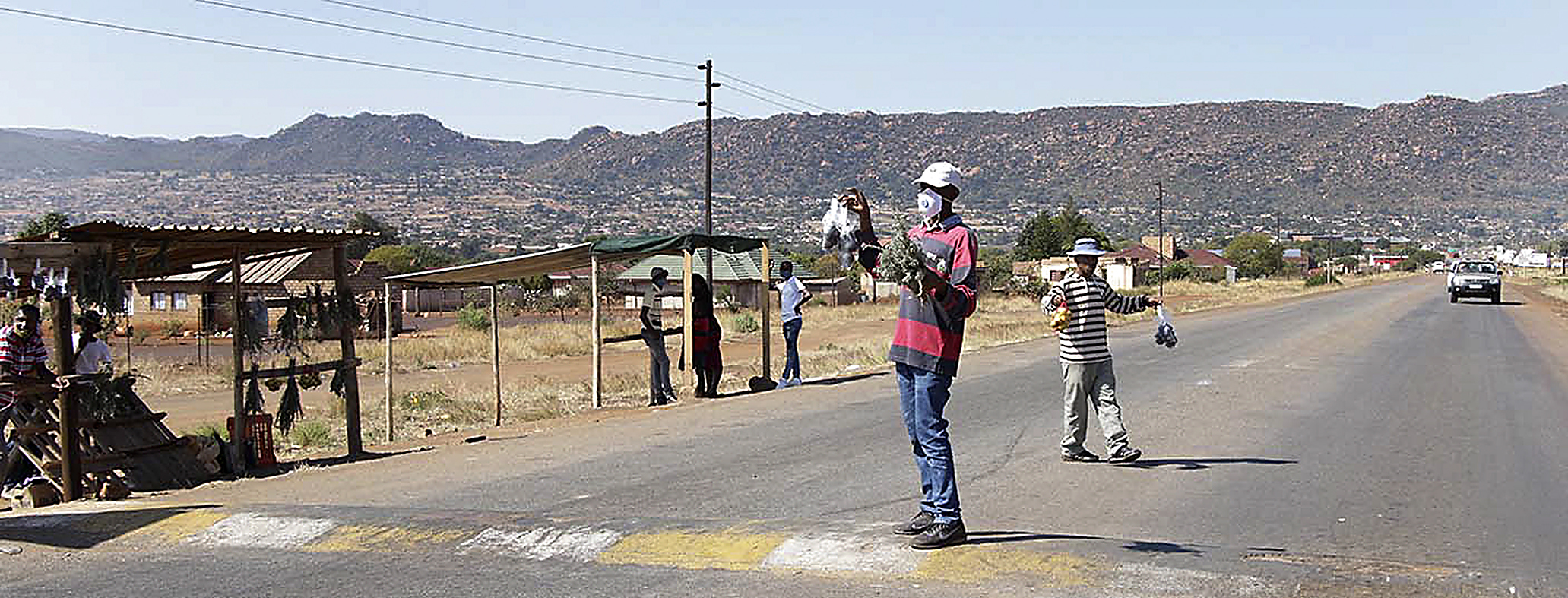/file/dailymaverick/wp-content/uploads/MC-Herb-Lucas_3.jpg)
Paul Manogo stood on a hill overlooking a valley where the lengana herb grows in abundance. He is worried about a sudden increase in the harvesting of the plant which has been catapulted into international prominence after Madagascar claimed it could cure the coronavirus. Since claims that the lengana, which locals have used to cure respiratory ailments for generations, can cure the coronavirus spread, locals in the villages around Jane Furse in Limpopo have seen an increase in the number of people coming to harvest the plant.
The herb grows in abundance along the Leolo mountain and hills that tower over the villages in the Sekhukhune area of Limpopo.
/file/dailymaverick/wp-content/uploads/MC-Herb-Lucas.jpg)
Manogo said he has decided to guard the area because locals stand to lose if they allow unmonitored harvesting of the species.
“I am here to protect this tree from people who are recklessly smuggling the plant, and they say it heals corona, but it does not,” said Manogo.
Another resident Masolasola Nkosi of Emkhondweni village said that the demand for the herb has increased lately.
“We know that those herbs worked to treat sickness like flu and others, but our problem is that we now have strangers coming for our plants, some of them speak languages we don’t know,” said Masolasola
He said on Tuesday they turned a group away and refused them permission to go to the mountain.
/file/dailymaverick/wp-content/uploads/MC-Herb-Lucas_1.jpg)
The plant is found all over the mountain behind Schoonoord, west of Burgersfort in the province's Sekhukhune district.
“There is a belief that this plant treats flu, and because of Covid-19 outbreak, there’s some belief that it cures the virus,” he said.
At Leolo village, traditional leader Ledonandaba Victor Nkosi called a meeting with police and pleaded that they should help to stop the harvest in his area.
“It is disturbing to see people from other areas coming here to harvest this plant,” said Nkosi.
/file/dailymaverick/wp-content/uploads/MC-Herb-Lucas_5.jpg)
According to the Herbal Garden, lengana (Artemisia Afra) is one of the most widely used herbs in SA. It is known as umhlonyane in the Nguni languages.
Nkosi said his fear is that since there is no more additional confirmation the increasing demand may be dangerous.
“They saw it on television, now they are all over the mountain, now we are pleading for the activity to stop,” he said.
“We asked police to help us, because these people are even removing the roots of the tree which is abnormal.”
Nkosi said if it indeed works it should also benefit his subjects and warned against dangerous prescriptions that could be made on the street.
Standing in the middle of road D2219 Tumelo Mahlo holds up a bundle of lengana.
/file/dailymaverick/wp-content/uploads/MC-Herb-Lucas_2.jpg)
Mahlo was a fruit and vegetable vendor when the coronavirus outbreak hit the world forcing some formal and informal businesses to shut down.
When President Cyril Ramaphosa announced a lockdown in March, Mahlo and other informal traders around Jane Furse found themselves without an income.
However, when the lockdown was moved to Level 4 a fortnight ago he returned to the busy road that links Jane Furse and Sekhukhune’s major mining towns of Steelpoort and Burgersfort to sell lengana.
Wearing a surgical mask, Mahlo moved from one vehicle to the other along the road’s speed hump where he has set up a makeshift market.
Mahlo said he realised that lengana, a new product on the streetseller’s makeshift wooden shelves, was topping the sales and that he had to join in, and it has brought a huge change in his sales.
Speaking to Mukurukuru Media, the 29-year-old Mahlo from Manganeng village near Jane Furse in Sekhukhune, Limpopo, said he saw others selling and ongoing customer enquiries made him also join the traders.
Mahlo sells a bundle for R20 and R40, and plans to increase his stock as more people are enquiring about the medicinal plant.
The high demand increased despite warnings by the World Health Organisation (WHO) that there are no published scientific studies of the herb and that its effects have not been tested.
However Madagascar President Andry Rajoelina has slammed the WHO for not supporting the herb and has announced plans to distribute it through west Africa.
The African Union has stepped into the debate and vowed to help Madagascar to explore more on the remedy it presented. According to the AU, Madagascar has agreed to collaborate with the union’s Centre for Disease Control.
Health Minister Dr Zweli Mkhize said that the Madagascan government had requested SA to help investigate the scientific basis on which such a drug could be used against Covid-19.
Indigenous knowledge system expert Dr Wally Serote said lengana is undisputed medicine that has been used to treat patients in Africa for years.
He said given Madagascar signals the plant should be given attention and “unleash potentials”.
“I heard the news that Madagascar is using it and they are using it on coronavirus, and some customers want it,” said Mahlo.
Like many other street vendors in the area, Mahlo does not buy this product.
Instead he walks for hours into the nearby mountain to harvest the herb.
“I wake up in the morning at 4am, go to the mountain very far and I will come back around 10am, and proceed to the market,” he said.
Now Mahlo and other locals are facing serious competition from a scramble for the herb by outsiders who drive to the area to buy from locals and go and sell elsewhere.
Community leaders said for days they were stranded and not knowing what to do when the scramble began, but a community meeting by leaders resolved that smuggling of the species must be stopped.
Villagers said if indeed the plant heals the virus, they couldn’t allow outsiders to harvest their resources and leave them poor.
They said those who come to harvest the medicinal plant invade the area early in the morning while they are still sleeping and wake up to see groups of people loading bags and naked bundles into bakkies.
Freedom Park Trust CEO Jane Muhammad said the debate on Madagascar remedy discovery also presents an opportunity for Africa to ensure that it’s medicine is standardised.
She said India and China are good examples of how to standardise traditional medicine for healthcare.
“More research needs to be done in collaboration with other institutions, it may alleviate the problems,” she said. DM/MC





 Tumelo Mahlo stands in the middle of D2219 road near Jane Furse selling Lengana as the demands increase because of coronavirus. Lengana is a claimed healing plant from Madagascar.
(Photo:Chester Makana/Mukurukuru Media )
Tumelo Mahlo stands in the middle of D2219 road near Jane Furse selling Lengana as the demands increase because of coronavirus. Lengana is a claimed healing plant from Madagascar.
(Photo:Chester Makana/Mukurukuru Media )